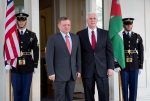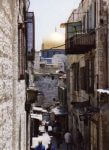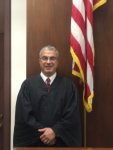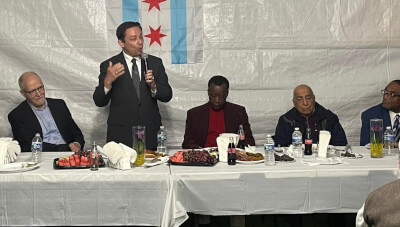Muslim and Christian Arabs need to collaborate to strengthen their voices
Arabs in America are weak in part because of their lack of unity and unification. Over the years, the community has divided into politics, national origins, religion and even tribal factions. Many of our community no longer refer to themselves as Arabs, and instead identify by the religion, or their countries of origin, diluting our voices and weakening our efforts to fight for justice. But unity has to start with our religions. Arab Christians and Arab Muslims need to come together and identify as Arabs.
By Ray Hanania
There are a dozen mosques in Chicagoland and there are almost as many Arab Christian churches. And, yet, like in the Middle East, there is very little cooperation between them.
But the upcoming holidays for both of them present a unique opportunity for Christian and Muslim Arab leaders to take the initiative to bring both communities together.
In April, Christian Arabs will celebrate Easter, Catholic and mainstream Christian Arabs on Sunday, April 21 and Orthodox Arabs one week later on Sunday April 28. Christians commemorate Easter as the date in which Jesus Christ, a Prophet to Muslims, was crucified and resurrected during Biblical times.
Just two weeks later, Muslims will celebrate the beginning of Ramadan on Sunday, May 5, upon the sighting of the crescent moon, ending on Tuesday, June 4. Ramadan represents the first revelation of the Qur’an to the Prophet Muhammad and is commemorated by a complete fasting during the entire period from sunrise until sunset.
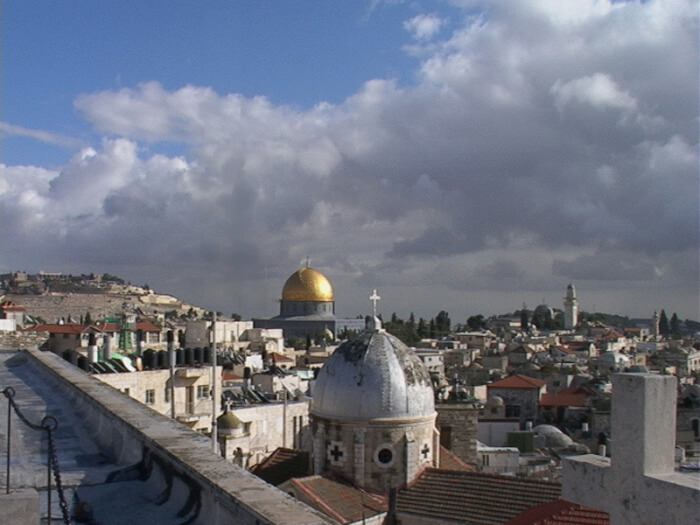
Many Christians in the Arab World also respect the Islamic fasting by also not eating in public during that period, a sign of solidarity with Muslims.
There are only 4.5 million Arabs in the United States, although the U.S. Census, which discriminates against Arabs, asserts that are less than 2 million. Of the 4.5 million Arabs, the majority, or 65 percent are Christian. That represents only a very small percentage of the 240 million total Christians in America.
Arabs only make up about 25 percent of all of the 7 million Muslims that reside in the United States. The largest group of Muslims in America Are African American followed by Pakistanis and Afghanis.
However, the Arab identity would be far more powerful if Arabs came together as one community divided not by religion but unified by a common cultural heritage that has been the source of many of the greatest achievements in World history, from Algebra, surgical instruments, clocks, and map-making to the discovery of coffee beans as a refreshment in Yemen and Southern Arabia.
Instead of being revered, though, Muslims in America are victimized by rising Islamaphobia, while Christian Arabs are marginalized by mainstream Christians. Most mainstream Christians are surprised to learn that there are Arab Christians like myself. After the terrorist attacks of Sept. 11, 2001, an American woman at a university where I was giving a speech came up to me and said she was surprised that I had “abandoned my Christian faith to become an Arab.”
I explained to the woman, as politely as I could, that my father’s family is from Jerusalem, probably Jewish converts to Christianity, and my mother’s family is from Bethlehem. One of my cousins is the pastor of the Church of the Nativity where Jesus was born.
Still perplexed, I told her, “Jesus is my cousin, lady,” a statement that often sends everyday Americans into total mental paralysis.
While Arab Christians and Arab Muslims can do far more to unify as one community, the bigger problem they face is the ignorance and lack of education most Americans have about Arab history, Arab culture and specifically the issue of Arab Palestine, the origin of both Christian Arabs and Muslim Arabs.
Some of the biggest Arab Churches include St. George Church in Cicero, St. Mary Church in Chicago Ridge, St. John the Baptist Melkite Church in Hillside, and Our Lady of Lebanon in Lombard.
Some of the biggest Arab Mosques are the Bridgeview Mosque Foundation, the Prayer Center in Orland Park, and the Mecca Center in Willowbrook.
Keep in mind that both the Arab churches and the Mosques also have non-Arab members.
Still, if the leaders of the Christian Arab and Muslim Arab religious leaders would come together, it might help not only to strengthen the voices of Arabs in the Chicagoland area, but it would also serve as a point of education to the true nature of the Arab people for Americans.
Americans are among the most educated people in the world but oftentimes the least educated about the world. They don’t know the difference between Palestinians and Pakistanis, or Iranians and Iraqis.
While we tend to look at ourselves and see differences, mainstream Americans look at all of us and see similarities. To Americans, we all look the same.
So if we look the same to the community that most needs to understand who we are and what we are about, why should we live our lives separate from each other as Christian Arabs and Muslim Arabs?
We should come together as one community of Arabs and strengthen our voices for all Arab causes. It would go a long way to strike down the stereotypes that keep us oppressed in this society.
(Ray Hanania is an award-winning former Chicago City Hall reporter, and syndicated columnist. Visit his personal website at www.Hanania.com.)


- Israelisnipers shooting and killing hospital workers in Gaza - December 11, 2023
- CAIR Condemns Israeli Executions of Wounded, Unarmed Palestinian in West Bank - December 11, 2023
- Arab and Muslim American voters face a “simple choice” between Biden’s inhumanity and Trump’s edgy politics - December 9, 2023
















